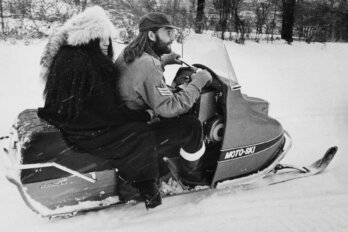Forty-five years ago this summer, a group of Indigenous youth sat around the kitchen table in my apartment, which was not uncommon, as my apartment was always filled with Indigenous activists who were usually young. This group was ambitious, not for themselves but for our nations. I remember some of them: Larry Joseph, Joan Carter, Bill Hewitt, Ronnie Ignace, Ray Bobb, Henry Jack, and David Hanuse were regulars. There were many more. Most of the young people in this meeting were committed to something specific. Halfway through the discussion, Larry Joseph grabbed a cast-iron frying pan from inside my oven, put it on the stove, and turned on the gas. He took some cedar from inside his shoe and threw some of it into the pan. He then passed it around the room. We all solemnly stated our commitments over the scent of burning cedar.
“I am going to get a PhD and set up a Native-studies program, in which we don’t have to learn so much about Canada and what it did to us but instead learn about ourselves—all the stuff we should have known if we hadn’t gone to residential school.” This choked us. The others because they had all been to residential school, me because it had never occurred to me that they did not have the same learning opportunities from the elders that I had had.
I was next, “I am going to write books. I am going to work with story, the way we always have, you know, when the old people would start telling some ten-thousand-year-old story, and by the time they got past the beginning, they were telling it like it was happening now. I know writing it won’t work exactly the same as telling it, but I think I can get close. I want to spiral people down into our old stories, so that these people can know who we are and who we will always want to be, as my Uncle Leonard says.”
“Won’t that turn out some white people who are just like us?”
“Yeah,” I said with enthusiasm. Everyone got quiet. No one was sure about that.
“If they think like us, then what would be the point of being different?”
“There would be no point at all.” And I laughed.
“They would all be Squamish, or Stó:lō, or Nu:Chahlnuth,” someone said and laughed even harder. “Then they would want liberation too.” The room got quiet again in that magic way.
Is that what Khatsahlano meant when he said to Major Matthews, “Everyone here is Squamish, just some of you aren’t any good at it.” Most of the youth making commitments achieved their goals many years later, but at the time, one of the youth, Larry, commented, “They still would not be good at it. You offer to share something with them—they will find a way to hijack it.” None of us were sure of what he meant then, but now I get it. We share our knowledge, and they hijack the expertise and get themselves hired teaching us. The exploitation side of their culture is hard to defeat, but this is not about that.
Some of the people around that table died a long time ago, some are dying as I speak, and others achieved their goals. Some drifted apart from me, and I don’t know where they are anymore, but most held on to their convictions. There is a university on the West Coast, Malaspina College-University, that focuses on Indigenous studies, not on what Canada did to us, and it uses some of my books. I succeeded in being able to tell an old story as though it were happening today. I succeeded in writing my stories in the same structure as an old longhouse tale. I learned English well enough to transform it to accommodate me. My stories are layered the way a good West Coast story is; they are poetic, and they begin with the old and become modern. I became an orator, and I came to understand our condition, the road to our transformation, and the path to liberation in the process—all through story.
I came to understand what the elders had been trying to teach me when I was small. I came to be able to examine story for its law, politics, sociology, environmental science, literary character, and its medical content. I came to realize how much of our knowledge is embedded in our stories. I also came to see that these stories were keys to our knowledge texts, our oral knowledge. I also came to understand that many of my own people did not know this—residential school interrupted our cultural continuum.
In the beginning days of my teaching career, I talked to other people about story, about the embedded knowledge in story, and about how that embedded knowledge was a key to a large amount of oral text. Even if you knew the language, we needed to be able to discuss these stories as a group, and discuss the knowledge attached to them, and to aggregate our own schools of thought. I learned that writing could hasten that process.
“There are some things you can’t say in English,” someone interjected.
“That is because the people who speak English well generally don’t speak the language, and the people who speak the language don’t generally speak English well. That is why the translations are so bad,” I added. “We need to talk to the old ones who know the story, then talk to those a generation ahead who know both the language and the stories and whose English matches the stories. Then we need to be able to put this all in scholarly terms.”
“That’s three different translations. We are going to need a lot of gophers,” Larry interjected. Everyone but me laughed.
“I am volunteering to be one of those gophers.”
“Vi Hilbert already volunteered.” She was a scholar as well as a language speaker and a story keeper. Vi was my relative. So was Janet McCloud. She did not know the language, but she knew story and her spoken language was literary. My daddy too; he knew the stories in both languages and his English, while not scholarly, was terrific for translating and transmogrifying story—he was literary in his spoken word. He was a fine poet in English. He was a fine musician in any language. He would help me, so would Vi, and so would Janet. They all did. All I had to do was transform the language enough to accommodate our story and recraft it so the other people would understand.
I talked with others, and we worked out the principles of our story in themselves first. We tell stories in the leanest narrative possible so that the listener will be inspired to see themselves in the story, add to the story, or build a new one or shift the story’s direction. The whole world has to be in the story. Someone said I tried to do too much with my novel Ravensong. I felt like I wanted to do more, but if I had, others would not be able to add to it or put themselves in it. By “too much” he meant that I failed the narrative and did not exploit the story enough. This actually made me happy. We are not supposed to exploit anything to do with story.
Our death was always massive in the epidemics we endured. The flu still takes a number of us with it. Suicide is never singular. Divorce is massive, abuse even more massive, and trauma, too, comes in multiples, so the simple business of “conflict” between protagonist and antagonist makes no sense to us. Our stories are about tension between something and the people. That something could be the state, the medical profession, the education system, the social workers, or all of the foregoing at the same time. When these tensions converge, Canadians get confused.
Our stories are journeys to the centre of our world. They begin on the outside of the circle, then a spoke leads the reader to the centre and back out again, to the outside of the circle, until another spoke appears and another sashay to the centre of the circle is required, then back outside. This continues until the reader has spiralled down to a moment of peace and recognition and can then spiral out to meet the world. At the end of each spoke, there is a window to the centre, where the unknown and precious thing we all love lives. It is only through this dance through story that we are able to discover the hidden and precious thing.
I would love to dance you all through Celia’s Song and Ravensong and the other stories I have told, but this article is not about that. It is about the value of that to Canadians. I have a wheel of understanding. It is readily accessible. My remembering is effortless. Others must “study, study, study” to pass their exams, but I just had to attend class and listen in an Indigenous way, story it up next to my already-existing wheel of understanding. No new dendrites were required for me to remember things like “economic determinism”; I know what it is and where it sits on my wheel of understanding. I know why it falls short of its goal in painting a picture of how to understand the modern world, but this article is not about that either.
This article is about hearing a story from us that is written by us, not as though we were you but as though you were us. That is how I write. Any Indigenous person from the West Coast can understand my writing, appreciate my story, and cherish the words embedded in each paragraph. Many of the other Indigenous nations of Turtle Island can also understand my stories, appreciate them, and cherish the words embedded in each paragraph. If you are not Indigenous and you do not understand, it is because you came here and thought this was Canada, this baby country made of foreigners, who killed us and usurped whatever authority we had over our lives and lands, and so we could not teach you. You can learn through studying our story.
Remember when you study our story from your lens, you come to non-Indigenous conclusions about us. I am okay with that. I do not wish to naturalize anyone and transform them into us, but I have never been able to tolerate others telling me how we are, and I do not believe anyone but us knows who we are. I hope you are all okay with that.
Someone once asked me why I didn’t just write story the way Europeans do. Sometimes I do. It depends on the story. I am working on a novel just now that I believe is a “Canadian story”; that is, it is a story about the last 150 years of Turtle Island. So I write it in typical Canadian narrative, not too many characters, no multiple themes, etc.—just a simple story of “looking for our father’s landscape.” It is our story, both Indigenous people and non-Indigenous people’s story. But if it is a Salish story, then it makes no sense to try and fit it into English literature. I will not go to anyone’s table empty handed; that is not my tradition. I come to your table with a full banquet. You may not want my food, but I am okay with that, but I will not come with nothing to offer. Writing is food, the food of the heart, mind, and spirit. Stories are our banquets.
I write because I cannot fall silent into a backwash of Canadiana after having produced 15,000 years of story. I write because I want our youth to know that we have value, we have knowledge, and we have a place in this world. The place we have was carved for us by our ancestors, who loved us so much that they died that we might live.
In Coast Salish culture, art means a way of life. Every part of our life was creative and artistic. Our life-giving creativity was meant to guide our future generations and beautify our lives. Our lives would be empty without art. Our stories are the foundation of all our art. Prior to colonization, these stories were all oral. Some of the storytellers were keepers of story. They kept the original version alive. But some of our storytellers were artists, working with the original story. We would begin to tell an old story, and then, as we moved through the story, we would update, modernize, and create a story about today. In this way, we are constantly telling back the old story, different but the same, and we are continuing to learn from it. We continue to glean guidance from our original stories, and by telling them back different but the same, we are adding to our historical continuum, creating new mythology from the old. In this way, we become different but the same as our ancestors.
We learn new things, and we use these things not to become someone else but to augment our Coast Salish being. My learning to write was like adding a new rafter to the longhouse. I write so that I may continue to be Salish in the colonial world I inherit. I write to influence the world I inherit. I am not a beggar in need of someone else’s cultural capital. I have plenty of cultural capital of our own. By writing, I am transmitting the cultural capital of the Salish people, from whom I arise, to the world.
Embedded in our stories are our laws and our relationship to the earth, the sky, the waters, the animal kingdom, and the bird kingdom. Even the invisible beings (bacteria, viruses, etc.) have a place in our universe. We respect all beings and do not fool ourselves into behaving as though we are the only creatures deserving of life. Our stories tell us that we are no more important than a snow flea on a glacier. In fact, my son tells a story of him and an old Anishinaabe man. My son told the man that the white people think we are worthless. The old man says, “Did you thank him?” “No,” my son said emphatically. The old man laughed. “We are the only beings in the world that are completely worthless. We add nothing to the environment. If all the human beings died, everything else would flourish. We are the only beings that not only add nothing to other life, but we steal the very existence of other beings.”
I write so that I can counter the anthropocentric belief that humans are somehow “higher beings” than anything else on earth. I write so that I can counter the sexist notion that women are unimportant. We are the transmitters of culture, the carriers of culture. Indigenous men writers write about “what happened to us,” but they do not write about who we are and how we are; the women writers do that.
When I write, I transmit the Salish being, the Salish world view. I pass on who we are to my future generations.
This continent could benefit from knowing what I and other women writers know. If you want to know and understand Indigenous people, Indigenous thought and being, then you must read the women writers. Women are still responsible for cultural transmission, and they still hold up this responsibility when they write.
Indigenous women writers spend their lives learning the culture of the others and figuring out how to transmit who we are to contribute to transforming the damaging culture that the newcomers brought. We struggle to do this by nurturing a new sensibility on this continent. I struggle with them. Embedded in our story is the new story that is waiting to be born. By writing, I reach a larger audience and can continue to reach greater and greater numbers. Writing has made me an agent of transformation on a grand scale in the world I inherit. I have a voice in many countries.
This essay is taken from the collection, Luminous Ink: Writers on Writing in Canada, edited by Tessa McWatt, Rabindranath Maharaj, and Dionne Brand, published by Cormorant Books, Toronto. Copyright © 2018 Lee Maracle. Used with the permission of the author.




